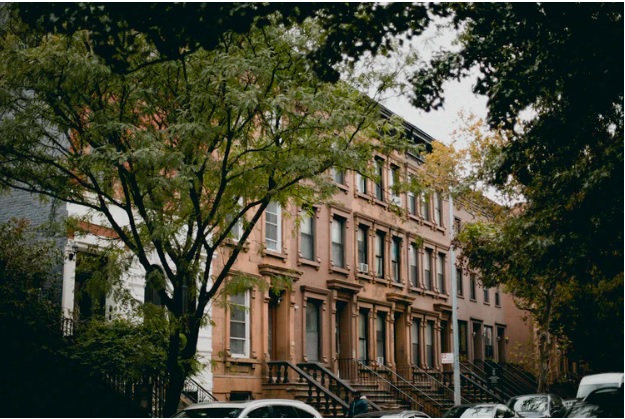 A broad array of organizations and community groups launched the NYC Homeowners Coalition, which will focus on New York City’s future, the strength of our local economy, and the preservation of our home values.
A broad array of organizations and community groups launched the NYC Homeowners Coalition, which will focus on New York City’s future, the strength of our local economy, and the preservation of our home values.
The Coalition already gained widespread support from groups representing over 600,000 individual members and 100 local labor unions in New York.
The initial focus of the Coalition is to oppose an annual New Tax on Homeowners.
With State and City budgets under pressure given the COVID-19 crisis and tax revenues declining rapidly, State Senator Brad Hoylman has proposed the New Tax on Homeowners (S44B), which would create a recurring, annual tax on certain qualified homes and increase filing and compliance costs for many more.
To learn more about the coalition, please visit https://nychomeowners.org.
The NYC Homeowners Coalition strongly opposes this new tax because it would:
- Raise property taxes as much as 13.5% on non-primary residence apartments with an assessed value as low as $300,000, even when they are owned by seniors
- Impact tens of thousands of middle-and upper-middle-class homeowners who will be forced to reappraise their homes every 3 years to prove their home value and make it harder to sell their homes
- Risk $350 million in wages, salaries, and benefits for workers supported by non-primary residence owners
- Cost over 5,500 construction-related jobs every year for 10 years
- Generate revenues covering only roughly 1 percent of New York State’s growing $14.5 billion budget gap
- Cause a net loss of well over $300 million annually in tax revenue to the State and City
- Cause a decrease in property values anywhere up to 31% depending on the value of the property
“We have over 35,000 residential members of our union in New York, and we recognize how our wages and healthcare benefits are supported in part by the homeowners we serve in the residential sector,” said SEIU 32BJ President Kyle Bragg. “This tax creates an unequal burden on Homeowners and could negatively impact our workers.”
“The New Tax on Homeowners will be detrimental to New York’s real estate industry and put our livelihoods at risk,” stated Heather McDonough Domi, Chairperson of the New York Residential Agent Continuum (NYRAC). “This proposed tax will diminish home values, causing a decline as much as 31% and slow development across New York City’s neighborhoods. These impacts will ultimately make it difficult for New Yorkers to sell their homes should they want to, putting thousands of real estate agent jobs on the line. Already our City and industry are among the hardest hit by COVID-19, and we need real solutions from Albany lawmakers that strengthen our economy and secure our careers, not weaken them.”
“Albany’s New Tax on Homeowners puts every New York City co-op building at risk,” stated Stuart Saft, Chairman of the Board of the Council of New York Cooperatives & Condominiums. “The proposed surcharge would be placed on the entire co-op building, obligating all shareholders to pay more if just one owner declined to pay.”
“While our lawmakers believe that the New Tax on Homeowners would only affect those at the top, they are neglecting to recognize the fact that this tax will negatively impact a range of industries – particularly building and construction,” stated Gary LaBarbera, President of the Building and Construction Trades Council of Greater New York. “These existing and new homeowners support new construction projects across the city, and if we push them out, our workforce is at risk.”
“It’s harder now than ever to sell a home in New York City, and middle-class families across the five boroughs are worried about how they are going to recover from this pandemic. The last thing these residents and homeowners need is another property tax increase through the New Tax on Homeowners,” stated Jennifer Stevenson, 2020 President of the New York State Association of Realtors®. “Our lawmakers should be focusing on ways to get our economy and our State into recovery mode without exacerbating an already challenging real estate market.”
“Albany’s New Tax on Homeowners will put thousands of construction jobs in jeopardy when our industry firmly believes continued smart and equitable development will be key to our State’s recovery efforts from COVID-19,” stated Louis Coletti, president, and CEO of the Building Trades Employers Association. “If our lawmakers follow through with the New Tax on Homeowners, they will put over 5,500 jobs at risk every year over the next ten years.”
“As New York looks toward its eventual recovery from the COVID-19 pandemic, the construction industry can build our state back stronger than ever, but the New Tax on Homeowners will greatly impact development,” said Carlo A. Scissura, President and CEO of the New York Building Congress. “If the New Tax on Homeowners passes in Albany, we could lose $8.5 billion in construction spending.”
“As New York City continues to face unprecedented economic challenges, lawmakers should focus on advancing data-driven policies that create good jobs, generate more tax revenue, and strengthen communities,” said James Whelan, President of the Real Estate Board of New York (REBNY). “This proposal would take New York City in the wrong direction by putting thousands of good jobs at risk, ultimately reducing City and State tax revenue and unfairly harming many homeowners across the five boroughs.”
Become a Harlem Insider!
By submitting this form, you are consenting to receive marketing emails from: . You can revoke your consent to receive emails at any time by using the SafeUnsubscribe® link, found at the bottom of every email. Emails are serviced by Constant Contact








